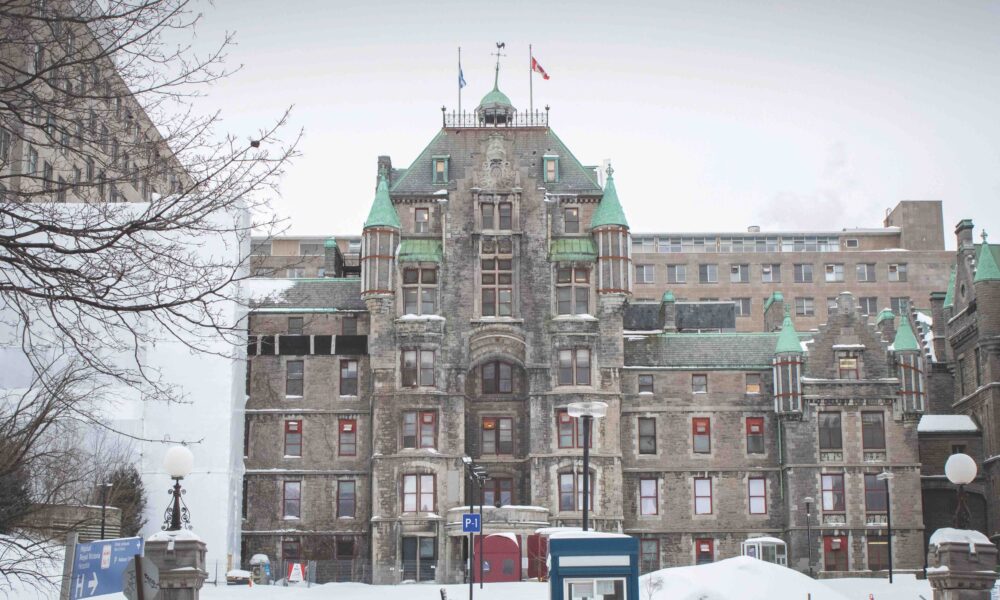A group of Kanien’kehá:ka kahnistensera (Mohawk Mothers) went to federal court against McGill University, the Ville de Montréal, the Quebec Government, and Stantec, on Jan. 14. The group is seeking an order to halt construction of the New Vic Project until a Mohawk-led investigation into potential unmarked graves on the previous Royal Victoria Hospital site is conducted. The New Vic Project is McGill’s proposal to transform a part of the Royal Victoria Hospital into a research, teaching, and innovation hub dedicated to Sustainability Systems and Public Policy—an interdisciplinary approach to environmental sustainability. The kahnistensera suspect that there may be unmarked graves of Indigenous children on the site, after it came to light that Dr. Donald Ewen Cameron experimented on a number of victims in the 1950s and 60s at the Allan Memorial Institute, which was then a part of Royal Victoria Hospital.
In an interview with The McGill Tribune, Kahentinetha, a kahnistensera applicant in the court case and founder of Mohawk Nation News, said that evidence for the unmarked graves comes from oral history passed down in her community.
“We knew about the children in the school that disappeared,” Kahentinetha said. “We were never told what happened to them. Nothing. Not a word. We’ve always suspected, we always heard things like that from our grandparents and great-grandparents.”
In a statement to the Tribune, McGill media relations officer Frédérique Mazerolle wrote that, based on a 2016 archaeological survey of the site, the administration believes it is unlikely that there are unmarked Indigenous graves.
“According to this study, it is unlikely that Indigenous remains will be found on the New Vic Project site,” Mazerolle wrote. “However, McGill remains committed to collaborating with the government and First Nations communities regarding potential vestiges. Should such vestiges be found, it will be made public immediately, the work will be suspended.”
Kahentinetha explained that the Mohawk Mothers’ argument rests on the larger claim that McGill and the New Vic Project are situated on land that was never ceded to Canada and is, therefore, still subject to Indigenous law. Kahentinetha’s interpretation of section 35.1 of the Constitution Act, which reads, “The existing aboriginal and treaty rights of the aboriginal peoples of Canada are hereby recognized and affirmed,” is that this clause makes Indigenous law the highest law of Canada. She also referenced section 52.1, which “reaffirms constitutional supremacy,” as evidence for the sovereignty of Indigenous law.
“Therefore, all the laws of Canada that are not recognized by our law and other true Indigenous laws are of no force or effect,” Kahentinetha said. “We are the very first people to ever bring this [section] to the court.”
Sacha Delouvrier, the Students’ Society of McGill University (SSMU) vice-president External Affairs, told the Tribune that SSMU does not support the New Vic Project, nor do they support the McGill Administration in the court case against the kahnistensera.
“As soon as the Mohawk Mothers spoke up, we definitely saw an opportunity to help them,” Delouvrier said. “We have to do what we can to strive toward the ideal of reconciliation, which is why we will support whatever position the Mohawk Nation takes.”
So far, the kahnistensera, the Ville de Montreal, the Quebec government, and Stantec have attended a two-hour court hearing on Zoom on Jan. 14, but the kahnistensera says the opposing parties are attempting to delay the proceedings by overwhelming them with court documents.
“They are using the protocols and documents to push us into the protocol swamp,” Kahentinetha said. “They don’t want the big question to come up […] about [sections] 35 and 52.”
Kahentinetha also explained that the kahnistensera are refusing to use lawyers in the court case because it goes against their traditional forms of justice, explaining that lawyers are part of a colonial system that oppresses Indigenous people.
“We don’t want a lawyer because a lawyer has taken an oath to the exact thing we’re fighting right now, which is the laws that are killing and oppressing us,” Kahentinetha said. “We have to do this by ourselves and we have to do it according to our ways.”








Historic judgement rendered on January 15, 2022 in Vancouver Canada could be of great importance in this matter.
Murder by decree.
18 pages of a new path that is now laid out before us.
Matter of case docket number 09152021-A001 ITCCS.
In other words the corporation of Canada id disestablished, from my understanding.
Pingback: Kanien’kehà:ka Kahnistensera file 141 pieces of evidence in court case against McGill - The McGill Tribune
Pingback: Archeological work at the New Vic site dominates McGill Senate meeting - The McGill Tribune